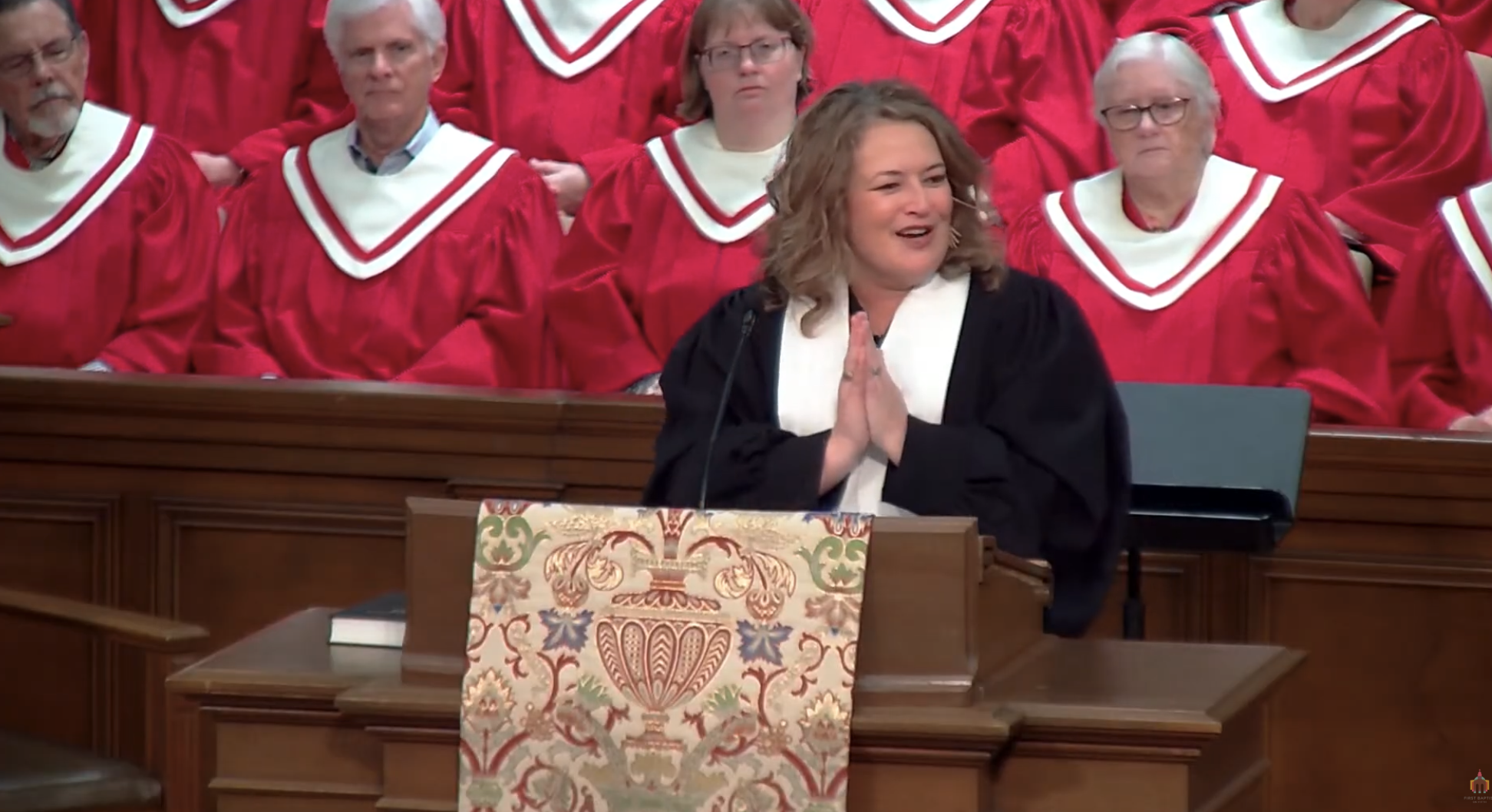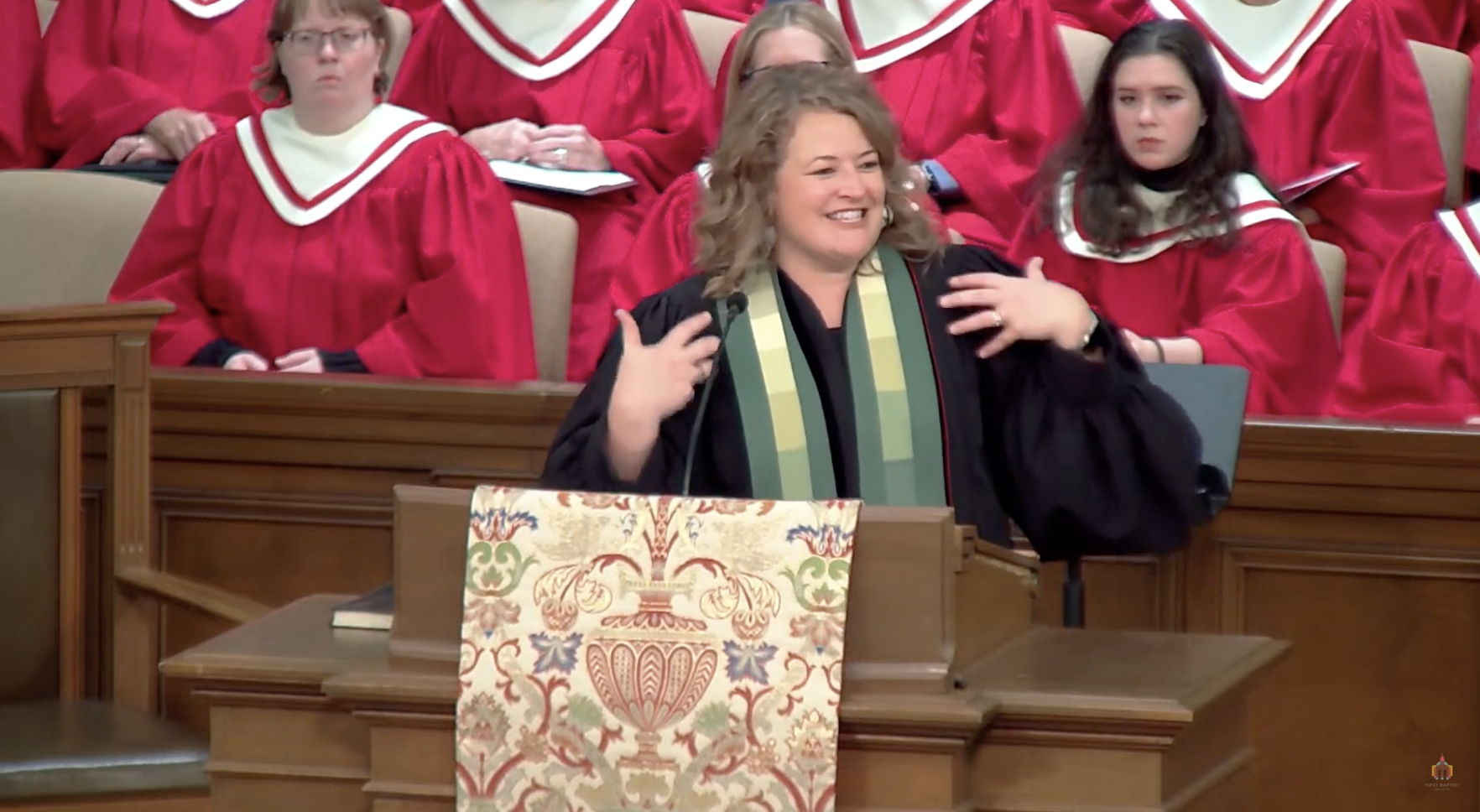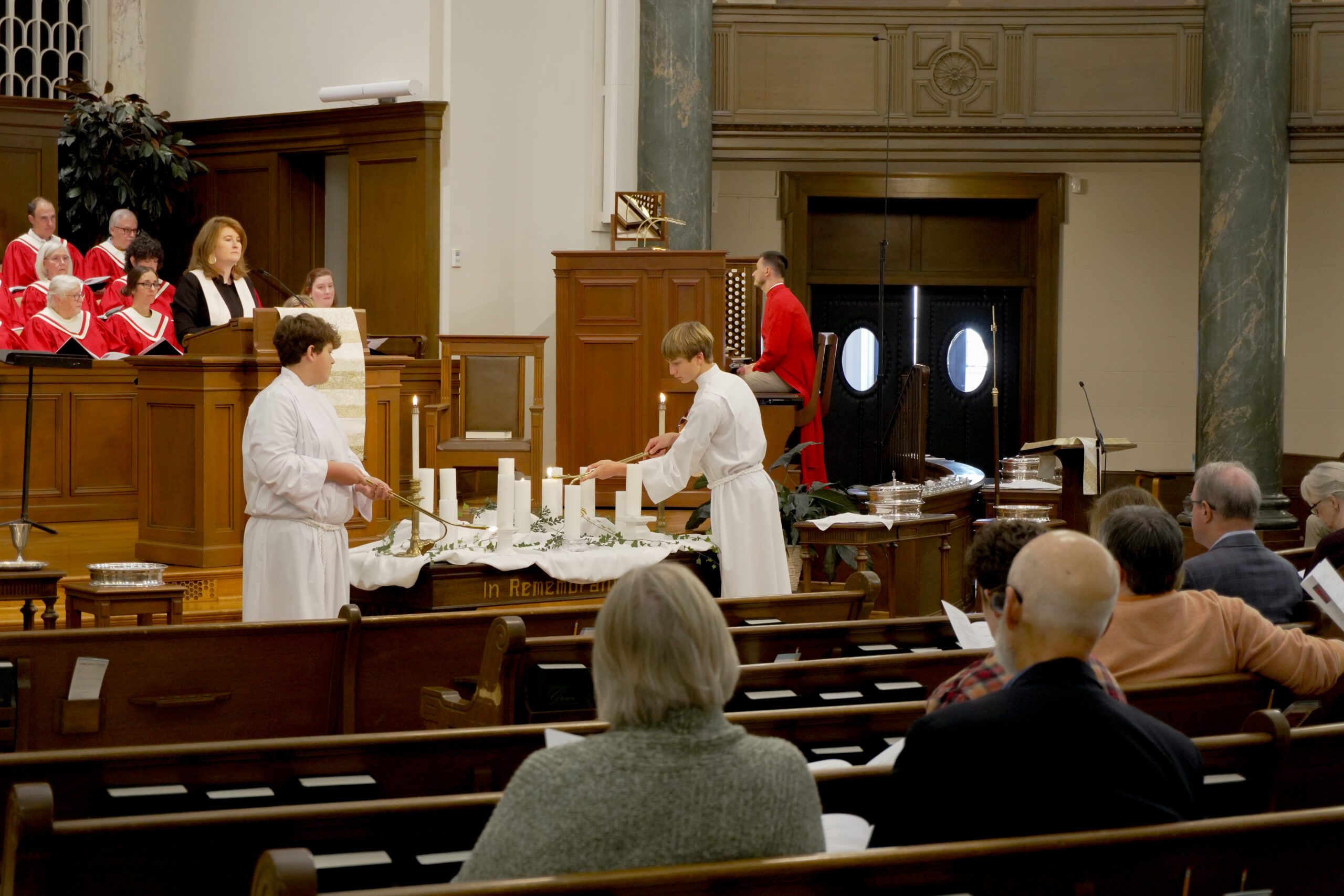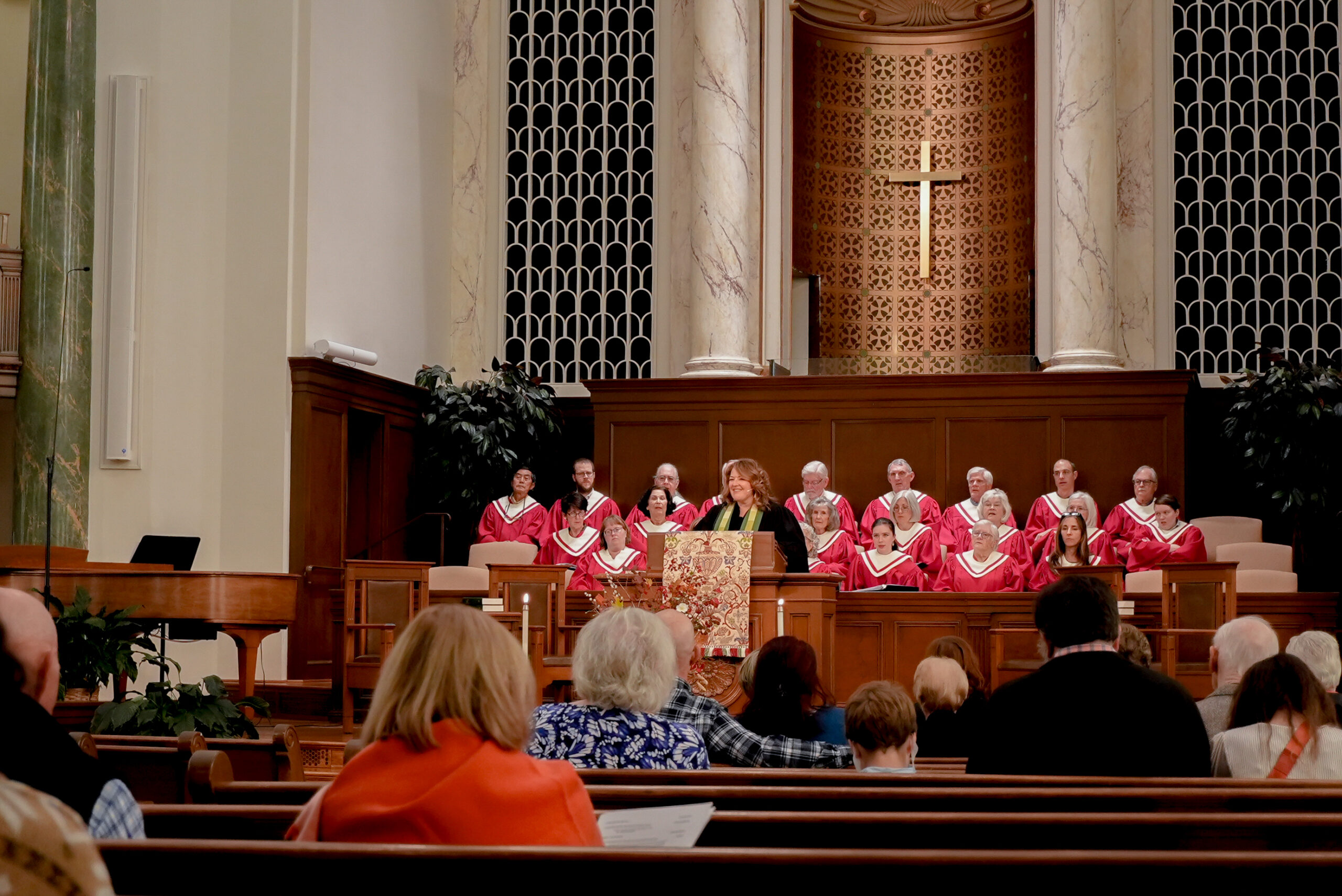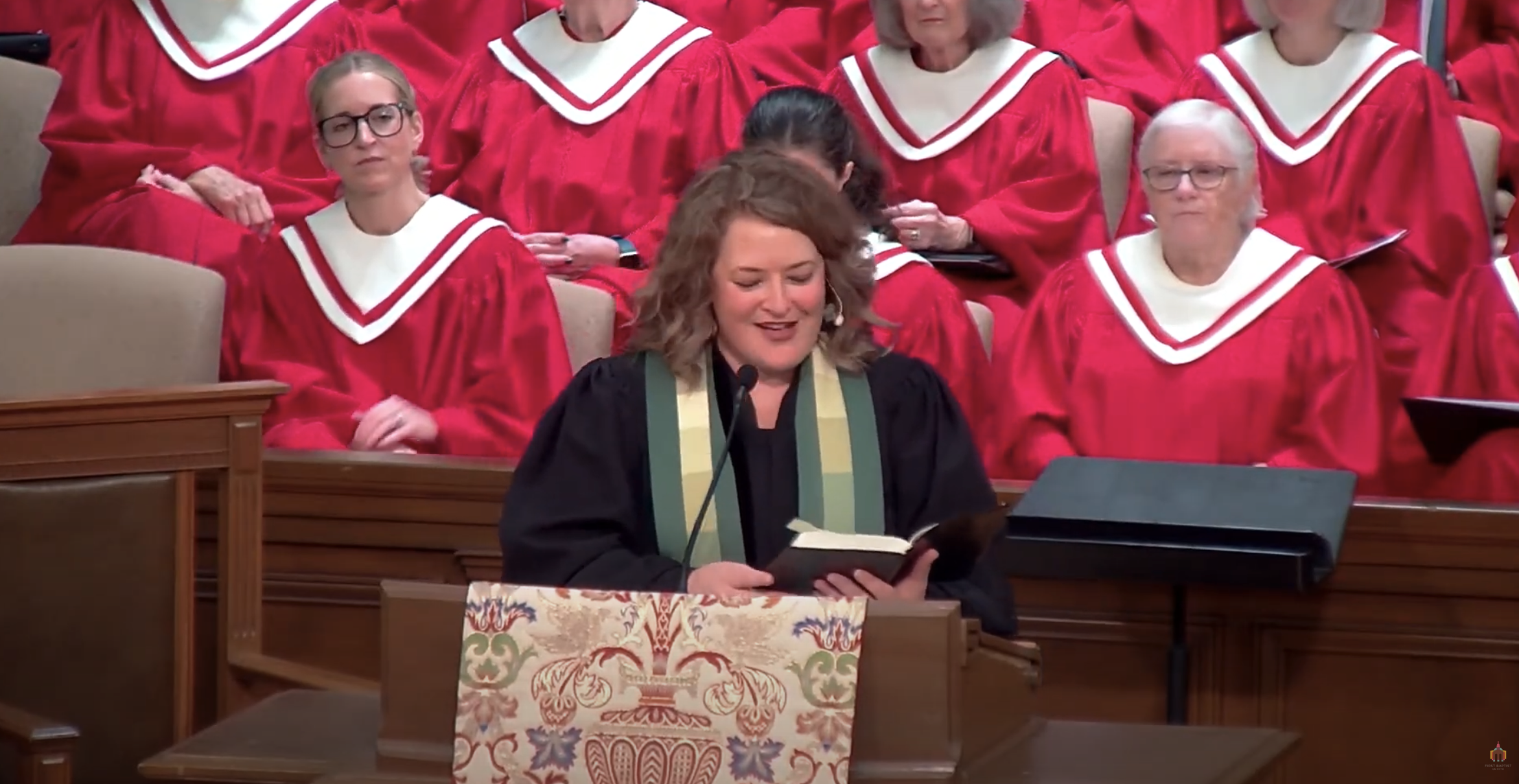I.“Awe came upon everyone,” Luke tells us. The writer of the gospel which bears his name and the storyteller of how the first disciples came to life in the Book of Acts, Luke invites us into the beginning of the story. For the Book of Acts is a creation story, a home-making story if you will, drawing us into the creation of the church as a people drawn together and animated by the Spirit of God.1 That’s where the awe comes from, as you might remember, on that day of Pentecost where the Spirit rushed in, and the people spoke out of many, one, and the crowds understood, and God graced the world with communities of disciples – sons and daughters, young and old – to carry the Jesus story into the world, and a new home was born.
“Awe came upon everyone,” he said, “for many wonders and signs were being done.” And then Luke describes the shape of their living, where the dynamism of Pentecost settled into the dailiness of the Christian life. “All who believed were together,” he said, “and had all things in common.”
Now here we might wonder: what were those things they had in common? Some things were, well, things: possessions used for any in need, and even, as we read later in Acts, their homes and lands. But mostly what they shared was a common story and the common practices that bring it to life. They shared awe and togetherness, rhythms and routines like breaking bread and exchanging gratitude, like praising God and looking upon all people with goodwill, like opening the scriptures and remembering the apostles’ teachings. It was a way of life so ordinary it’s captured in just a handful of verses, a way not unlike what David Whyte describes on the cover of your worship guide – miraculous in the turning up, day in and out, “doing the same good work,” and watching it mature “in our daily visitations into something we could not fully imagine.”2 Later in Acts, we’ll learn that this early community will be known by their great boldness, that boldness will be their distinctive, just as much as a common table, a common rhythm, a common praise, a common unity. Indeed, we’re given a vision here of what church at its heart should be.
These traditions of the ancestors they practiced patterned their lives – individually and communally – on Jesus’s. In the absence of Jesus, they understood his story needed retelling in words and actions. It’s a powerful image – this singular life of Christ, powerfully human and divine, and all the lives that flowed from his, all lived to the glory of God. The power of Jesus was just as present in the practices of ordinary life as it was in the passion of Pentecost. For the common ground here was Spirit-led and created, Spirit-tended and kept.
II.It’s “home-keeping” that forms our imagination today, considering how we keep or tend the homes of our lives. Over the past few weeks, we’ve talked about “homemaking” and “homebreaking,” images that may be a bit more defined. But this image of “home-keeping” conjures the expectation of the long middle of living. Sociologists tell us that this is where we live most the days of our lives – not at the thresholds of either beginning or end, of new and old, of creating or closing, but in the yawning horizon of perceived sameness in between. It’s no wonder these seasons cause us discomfort and leave many running to recreate a beginning or end to keep life interesting, even if it stirs up chaos along the way. Some feel a hollow emptiness to these years, the origin story of midlife crises all around the world. Others have experienced a questioning of all they’d once held, such that when the house of cards has fallen, overwhelm and despair settle into the void. Even more use this season for reinvention: for changing everything, or going on a new journey or passage, or reimagining identity.3
But these first Christians give us a window into the dailiness of home-keeping, from which I’d like to draw three encouragements and tell three stories. For you see, all of us are given the opportunity to tend and keep, and it is our rhythms, routines, and practices that construct a life and build a community. Or in the clearer words of Annie Dilliard: “how we spend our days is, of course, how we spend our lives.” So how, then, shall we live?
III.The first encouragement: Home-keeping tells a moral story. Humans are both the storytellers and the storied. We inherit stories, we live within stories, we pass stories on. It’s not an accident that the first conversation I have with couples in premarital counseling has a thick conversation with the prompt, “tell me about your parents’ ’ marriage.” Because for better or worse, what story they live or tell most closely informs the couple’s perspective about marriage.” Every gradient between “theirs was good” to “theirs was a disaster ending in divorce” forms our conversation.
Inherited stories are important and real, but they can’t always be the last story. Because home-keeping tells a moral story, if in the homes we tend day in and day out, we tell the story of victimhood we heard – “they took it from me” – victimhood becomes the story we keep. If in the homes we tend, we tell the story of scarcity we heard – “we’ll never have enough” – scarcity becomes the story we keep. And so on, and so on. “Virtues are narrowly formed,” one author reminds us, “hence they are never neutral.”4
How easy it would be for those early Christians to tell a story of the end. Jesus died and rose, but now he’s not here! But in the power of the Holy Spirit, they held a common story. They told it again and again, every time they broke the bread and gathered in the temple and shared their possessions and praised the Lord. It was a moral story, one that helps us know what to keep telling with our living.
One of my dear pastor friends with whom I share life is named Greg. Greg shared a story with our pastor group several years ago about a time in his life when his church told a new story for him. You see, when Greg was a young child, his parents got divorced. It was a hard and raw season for their family, and his dad moved 600 miles away shortly thereafter, leaving Greg and his mom to recreate their life in Greenville, South Carolina. They were already rooted in First Baptist Church there in Greenville, and in those years, the RAs (Royal Ambassadors – sort of like the Boy Scouts of the Southern Baptist Church) had father-son campouts each spring on the church’s softball fields. It was always a big deal when boys made it to the first grade and could start attending the campouts, but for young Greg, it brought about a fresh wave of grief. The old story kicked up again for him. “Dad’s not here. He didn’t love me enough to stay. I’m all alone.” But wouldn’t you know it – a man named Bert, a new friend of the family and a member of Greg’s mom’s Sunday School class, saw what was happening decided that Greg shouldn’t have to miss out on this opportunity just because his dad was not around, and volunteered to accompany him to the campout. As Greg reflected on this experience, he recognized that Bert did so, in Greg’s words, “because he wanted me to belong, and because he knew the deep truth that I belonged to the church.”5
Home-keeping tells a moral story in ordinary, extraordinary ways.
The second: home-keeping points toward shalom. “Like a diamond with many facets,” another author says, “shalom is the name for that time and place where all things thrive as God intends. Shalom is that end toward which God’s people walk in faith.”6 For when home-keeping is practiced with wisdom and care, it leads to flourishing communities, flourishing relationships, flourishing creation. Of course it asks something of each of us, for we all are participants and makers in the way of shalom. But in Christ, as Paul reminds us, “we are no longer strangers and aliens, but citizens with the saints and members of the household of God.” Together with God, we tend a world where all things are drawn towards their thriving. I think of those early Christians, and how they might not have even realized that they were creating community – they thought they were just gathering for dinners and sharing with their neighbor. But in God’s economy, day in and day out, keeping creates shalom, in our hearts and in our communities.
The late Fred Craddock, preacher and storyteller extraordinaire, used to tell about the small church in Appalachia he pastored and a certain custom they nurtured over the years. You see, they’d gather the newcomers who had made decisions to follow Jesus together every year on Easter eve, right at sundown by the river just down the way. Craddock would wade in the water, right out to the sandbar, with all the baptismal candidates, and the rest of the congregation sat on the shore nearby, singing hymns by the fire. After the baptisms, everyone would gather together, where each year, a man named Glenn Hickey – and it had to be Glenn – would lead the group by introducing the newcomers, sharing their names, what they did for work, and where they lived. After the newcomers came the old timers. Glenn worked his way around the circle, making sure everyone knew everyone. And the way they introduced themselves was like this: “My name is Mary, if you ever need somebody to do some washing and ironing.” Or “my name is Margaret, if you ever need somebody to chop wood.” Or “my name is John if you ever need anybody to repair your house.” Or “my name is Gary if you ever need a car to go into town.”
After the introductions, the whole crowd would sit down to a big, boisterous meal, then pull out the banjos and start dancing before dessert. When the darkness and chill of the night got the best of them, Percy Miller would kick dirt over the fire, and they’d all head home ready for Resurrection Sunday. Fred Craddock remembered his first time with this ritual, standing with Percy by the dying fire in the embers’ glow, when Percy said, “Craddock, folks don’t ever get any closer than this.” And with his usual flair, Craddock concluded, “In that little community, they have a name for that kind of experience. I’ve heard it in other communities too. In that community, their name for that is church. They call that church.”7
Home-keeping points toward shalom.
Finally – home-keeping transforms our hearts too. Much of the days and years lived in the “keeping” seasons of life are about others – children and parents, colleagues and neighbors, spouses and partners, other people in our communities and care – yet there’s no question that when we pattern our lives on the rhythms and practices of God’s story and the Spirit’s shalom, our hearts are transformed too. In fact, awe might even come upon us too. Our hearts will be flooded with love from those miracles that come by daily work.
One of the most poignant conversations I’ve had recently about home came at the hair salon, site and source of so many meaningful conversations for millions over the years, amirite? Laura has been my gal since the very beginning. She’s nothing if not tough: a New Jersey upbringing, a big and boisterous family, deaths of significant people in her life, relationships that thrilled and failed, trauma and restoration and loud love above all else. So when she told me months ago that her oldest son, early in his 20s, decided to leave their Yadkinville home to try out life on his own, I knew this would be a major shift for their family and for her. He’d become a kind of protector she never imagined she’d want or need, yet as a wonderful mom, she put his need to leave over her wish he’d stay and blessed his departure.
I asked her how Chase was doing since he moved up north, and she said, wistfully, that he’d come back home. Time away had been so good for him. He’d not gone to college when many of his friends did, and this was his own form of leaving the nest to find himself along the way. He had gotten a job, secured a place to live, even made some good friends and started a new relationship. She told me how he’d FaceTime with her, and how she could see the light in his eyes, which looked to her like an inner pride for what he was creating with each day away.
Months passed. His job was downsized. The relationship ended. He started to wonder, ‘what am I doing here?’ And as a wonderful mom, she reminded him that he could always come home. He pulled in their driveway late at night. The next morning when she heard his familiar stirrings, she went to his room to check on him. They exchanged the usual pleasantries – how was the drive, when’d you get in, the usual. Chase looked around: the worn posters on the wall, curling and tearing, from the band he liked sophomore year, his scuffed-up football helmet on the shelf, the hole in the wall from that night he got so angry that still hadn’t been fixed, the faded bedspread and shabby rug. She watched him and waited, letting the silence fill the room. “I just never thought I’d be back here, you know? I mean, look at this place. I feel like a total failure.”
A sharp pang in her heart, thinking of all the ways she had tried to create a home of safety and love, all the weekends she had to work to make a living, all the upkeep that had never felt as urgent as it did in that moment in the eyes of a returning son. “I know, sweetheart. I know.” Her voice wobbled and steadied. “But you get to choose how to live. You don’t like how your room feels? Then make it better. Fix the wall. Paint it. Clean it up. Make it better. I’ll help.”
She paused as she told me this story. She’s not all that sentimental, but I could see what it had cost her. “We went out and bought the paint that morning,” she said, her smile genuine and earned, “and had the best day painting his room together.” Now I may be wrong, but I think awe came upon her too.
Home-keeping tells moral stories. Home-keeping points us toward shalom. Home-keeping transforms our hearts too. In the dailiness, the routine, the practices, the rhythms, something old is made new once again.
So we pray to you, o God, take our lives, and let them be consecrated to you. Take our lives – the minutes, hours, rhythms, practices, routines, seasons, and relationships that fill it – and let it be for you. Take our paint rollers and bonfire church nights and youth retreats. Take our hands and feet, hearts and minds and bodies. Take our transitions and heartaches and pains. Take it all, o God, and flood our hearts with your love. Keep us close to your heart. Keep us even still. Amen.


